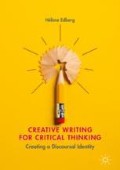Abstract
How can texts serve as sites of negotiation about learning and identity work? In the attempt to trace and describe how learning is negotiated between the learning environment and the learner, and how this process is constructed in a reflection text, this chapter presents a model for text analysis and some text-analytical approaches to apply it. The model is informed by activity theory, a sociocultural organizational theory. The model answers questions such as who does what, with whom, using what tools, driven by what object, and with what outcome, given their actions. The theoretical basis for linking context to text in this way originates in the framework of discourse analysis, which holds that texts are permeated by context and therefore will be open for contextual and ideological analysis.
Notes
- 1.
No utterance comes without a history. Utterances adhere to one another and to earlier utterances and to utterances in the futu re. Bachtin (1986) us ed Dostoevsky’s literary texts as a starting point for his theories about utterances in context .
- 2.
Cf. Perelman (2004) ab out the universal auditorium—that is, a model “listener” to rhetorical argumentation.
- 3.
Translated from Norwegian: created for herself a model reader as she wrote.
References
Bachtin, Michail (1986). The Problem of Speech Genres. Translated by V. Mc Gee. In: Speech Genres and Other Late Essays. Austin: University of Texas Press, pp. 60–102.
Bachtin, Michail (1991 [1963]). Dostojevskijs poetik. Translated into Swedish by Lars Fyhr & Johan Öberg. Gråbo: Athropos, pp. 218–228.
Björkvall, Anders (2003). Svensk reklam och dess modelläsare. Stockholm: Almqvist & Wiksell International, pp. 23–27.
Blåsjö, Mona (2004). Studenters skrivande i två kunskapsbyggande miljöer. Acta Universitatis Stockholmiensis. Stockholm Studies in Scandinavian Philology, N.S. 37. Stockholm: Almqvist & Wiksell International.
Dijk, Teun Adrianus van (1985). Handbook of Discourse Analysis. Vol. 1, Disciplines of Discourse. London: Academic Press.
Eco, Umberto (1994). Six Walks in the Fictional Woods. Cambridge, MA: Library of Congress, Harvard University Press.
Elbow, Peter (1973). Writing Without Teachers. London/New York: Oxford University Press.
Elbow, Peter (1994). Teaching Two Kinds of Thinking by Teaching Writing. In: Kerry S. Walters (ed.). Re-thinking Reason: New Perspectives in Critical Thinking. Albany: State University of New York Press, pp. 1–31.
Engeström, Yrjö (1987). Learning by Expanding: An Activity-Theoretical Approach to Developmental Research. Helsingfors universitet: Pedagogiska institutionen, Chaps. 2, 3, 4. Downloaded in March 2013 from http://lchc.ucsd.edu/mca/Paper/Engestrom/expanding/ch2.htm
Engeström, Yrjö (1996). Developmental Work Research as Educational Research. Looking Ten Years Back and into the Zone of Proximal Development. Nordisk Pedagogik 16/3: 131–143.
Engeström, Yrjö (2009). The Future of Activity Theory—A Rough Draft. In: A.-L. Sanninio, H. Daniels & K. D. Guitérrez (eds.). Learning and Expanding with Activity Theory. Cambridge: Cambridge University Press, pp. 303–328.
Gee, James Paul (2001). Identity as an Analytic Lens for Research in Education. Review of Research in Education 25: 99–125. Downloaded in February 2014 from: www.bl.uk
Goffman, Erving (1974). Frame Analysis: An Essay on the Organization of Experience. Harper Colophon (ed.). New York: Harper & Row, pp. 1–28.
Husserl, Edmund (2004). Idéer till en ren fenomenologi och fenomenologisk filosofi. Stockholm: Thales.
Ivanič, Roz (1998). Writing and identity: The Discoursal Construction of Identity in Academic Writing. Amsterdam: John Benjamins.
Ivanič, Roz (2004). Discourses of Writing and Learning to Write. Language and Education 18/3: 220–245. Downloaded in March 2010.
Ivanič, Roz (2006). Language, Learning and Identification. In: R. Kiely et al. (eds.). Language. Culture and Identity in Applied Linguistics. University of Bristol: British Association for Applied Linguistics. London: Equinox.
Joffe, Hélène & Yardley, Lucy (2004). Content and Thematic Analysis. In: D. F. Marks & L. Yardley (eds.). Research Methods for Clinical and Health Psychology. London: Sage, pp. 56–68.
Kaptelinin, Victor (2005). The Object of Activity: Making Sense of the Sense-Maker. Mind Culture and Activity 12/1: 4–18.
Ledin, Per (2013). Den kulturella texten: format och genre. In: Viden om laesning nr 13.
Leontiev, Aleksei (1978). The Problem of Activity and Psychology. Activity, Consciousness and Personality. Soviet Psychology 13/2: 4–33.
Linell, Per (2009). Rethinking Language, Mind and World Dialogically Interactional and Contextual Theories of Human Sense-Making. Charlotte: Information Age Publishing.
Linell, Per (2011). Samtalskulturer: Kommunikativa verksamhetstyper i samhället. Studies in Language and Culture 18. Linköping: Department of Culture and Communication.
Miller, Carolyn R. (1984). Genre as Social Action. Quarterly Journal of Speech 70: 151–167.
Perelman, Chaïm (2004). Retorikens imperium, Translated into Swedish by Mats Rosengren. Stockholm/Stenhag: Brutus Östlings bokförlag Symposion, Chaps. 9, pp. 129–136.
Säljö, Roger (2000). Lärande i praktiken; ett sociokulturellt perspektiv. Stockholm: Prisma.
Tønnesson, Johan L. (ed.). (2002). Den flerstemmige sakprosaen; Nye tekstanalyser. Bergen: Fagbokforlaget.
Tønnesson, Johan L. (2003). Tekst som partitur eller Historievitenskap som kommunikasjon: Naerlesning av fire historikertekster skrevet for ulike lesergrupper. Oslo: Universitetsforlaget.
Vygotsky, L. S. (1978). Mind in Society; The Development of Higher Psychological Processes. M. Cole, V. John-Steiner, S. Scribner & E. Souberman (eds.). Cambridge, MA and London: Harvard University Press.
Wertsch, James V. (1998). Mind as Action. New York: Oxford University Press.
Author information
Authors and Affiliations
Rights and permissions
Copyright information
© 2018 The Author(s)
About this chapter
Cite this chapter
Edberg, H. (2018). Text as a Site of Negotiation: A Model for Text Analysis. In: Creative Writing for Critical Thinking. Palgrave Macmillan, Cham. https://doi.org/10.1007/978-3-319-65491-1_5
Download citation
DOI: https://doi.org/10.1007/978-3-319-65491-1_5
Published:
Publisher Name: Palgrave Macmillan, Cham
Print ISBN: 978-3-319-65490-4
Online ISBN: 978-3-319-65491-1
eBook Packages: Social SciencesSocial Sciences (R0)

